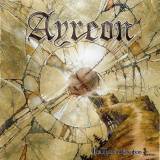My 10 Favorite Video Games of 2019
By matrix_hiei 0 Comments
I’ve seen a lot of discussion about whether or not it’s been a “good” year for video games, but 2019 turned out to be a fantastic one for my personal tastes. And look, I get the reasons why it felt… different. With new consoles on the very near horizon, there were fewer marquee AAA titles or big-budget sequels, and the kinds of games that usual clean up awards were nowhere to be found. In its place, however, seemed like a never-ending supply of smaller, independent games, and maybe more importantly, easier access to actually play them. Even though I cut this list down to 10, I could have easily included a number of games on Xbox’s Game Pass that I enjoyed enough to finish. Untitled Goose Game is a charming and genuinely funny couple of hours. My Friend Pedro is a fun take on if John Wick was a platform game. Slay the Spire and Void Bastards are both well-made roguelikes that I could see myself getting lost in if I wasn’t still about that Dead Cells life (which released some excellent free DLC this year and is also available on Game Pass). Even the larger scale The Outer Worlds was enjoyable enough for me to finish, even if the vast majority of the game failed to live up its incredible opening hours. More than I ever I felt surrounded by quality games, and below are the 10 I enjoyed the most:
10. A Short Hike
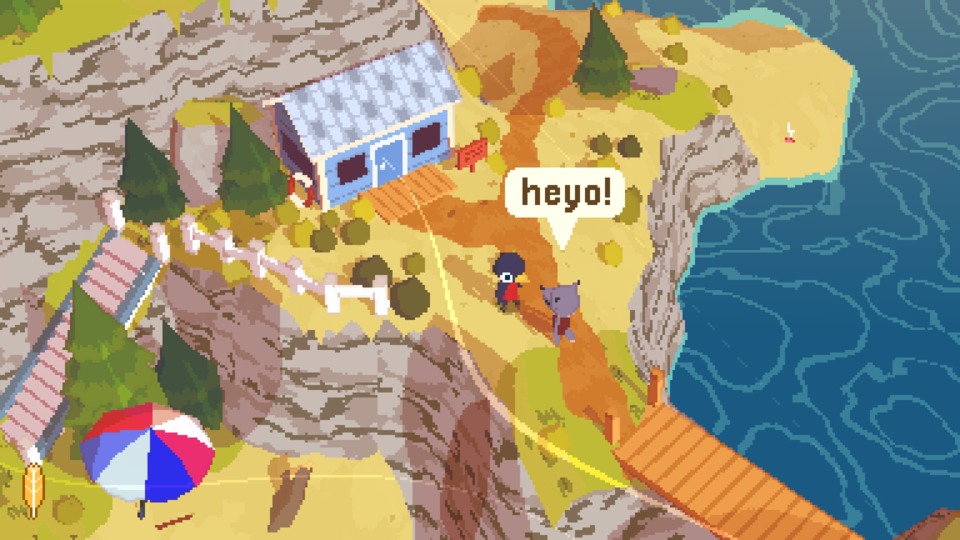
This is a delightful little game that snuck onto my list at the end of the year. It’s a bite-sized game about exploring a peaceful, child-like world with the aesthetics of an Animal Crossing or even a My Neighbor Totoro, only pixelated down to look like a cross between a SNES and N64 game. It’s gorgeous to look at, controls shockingly well, and tells a beautiful story in its brief 90 minutes that put a smile on my face.
9. Baba Is You

I will never beat Baba is You. I get that and I accept it. But despite how often it made me question my own intelligence, I can’t stop myself from loving it. The core mechanic of manipulating the rules of the puzzle itself is nothing short of ingenious and felt oh so satisfying to solve. It’s the kind of game that I thought about even when I wasn’t playing, and I would come back to my Switch with 6 or 7 different solutions to try. And on the rare occasion when one of those worked, I felt as elated as I ever have with a puzzle game.
8. Devil May Cry V
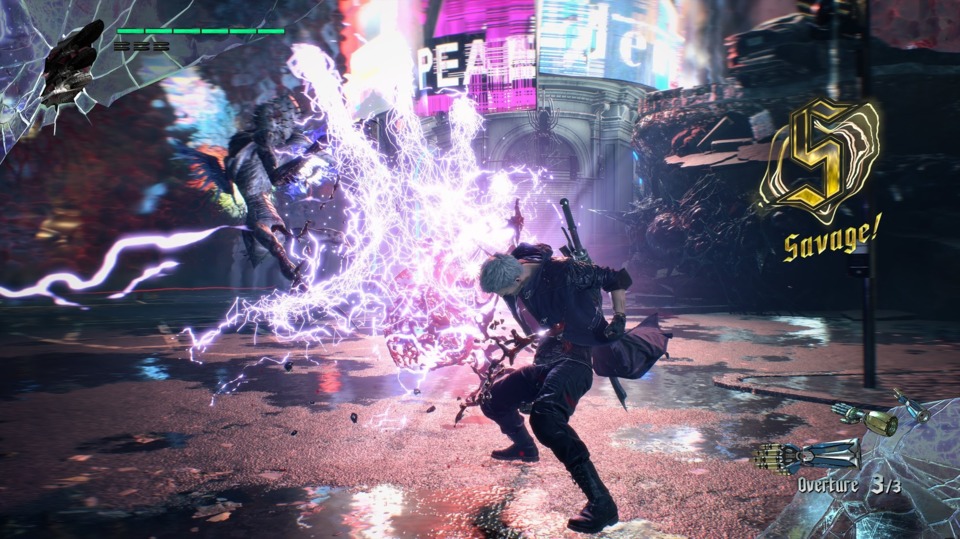
I rarely ever like hack-n-slash games, but for whatever reason, the Devil May Cry series has always been a major exception. There’s something about the way this combat system works that just feels natural to me. I never feel like I’m button mashing, nor do I ever feel like I need to study a complex combo system and think deeply about what I’m doing. Everything just controls exactly like my brain wants it to, even as the game has you alternating between multiple characters that all play meaningfully different. Those three distinct characters, a diverse upgrade tree, and wild boss fights all contribute to making the campaign seem far more varied than I expected, especially for something that is still a PS2-era action game at its core. If you haven’t liked the previous games, I doubt this one will change your mind, but it’s also about as good as a Devil May Cry game could possibly be in 2019.
7. Life is Strange 2
Despite its outdated episodic structure, I greatly appreciated the risks Dontnod took with a sequel to their breakout hit. The dialogue sounds far more natural than in the previous games, and while I understand the desire for more Max and Chloe moments, Life is Strange 2 is better for telling its own story and not relishing in fan service. Sean and Daniel Diaz are more than worthy protagonists, and their story doesn’t shy away from the systemic and personal racism faced by Hispanic Americans. There are gut wrenching moments here that feel earned through its writing and characterization, and it’s one of the better examples I’ve seen of small choices feeling meaningful. You can’t turn either brother into entirely different characters, but the choices you make feel impactful nonetheless. The writing is sharp enough that most of the options feel like realistically tough decisions for Sean that will have consequences but feel within his character, and it sticks the landing in a way that previous Life is Strange games haven’t. Now that all the episodes are out (and on Game Pass), I sincerely hope this finds a larger audience.
6. Fire Emblem: Three Houses
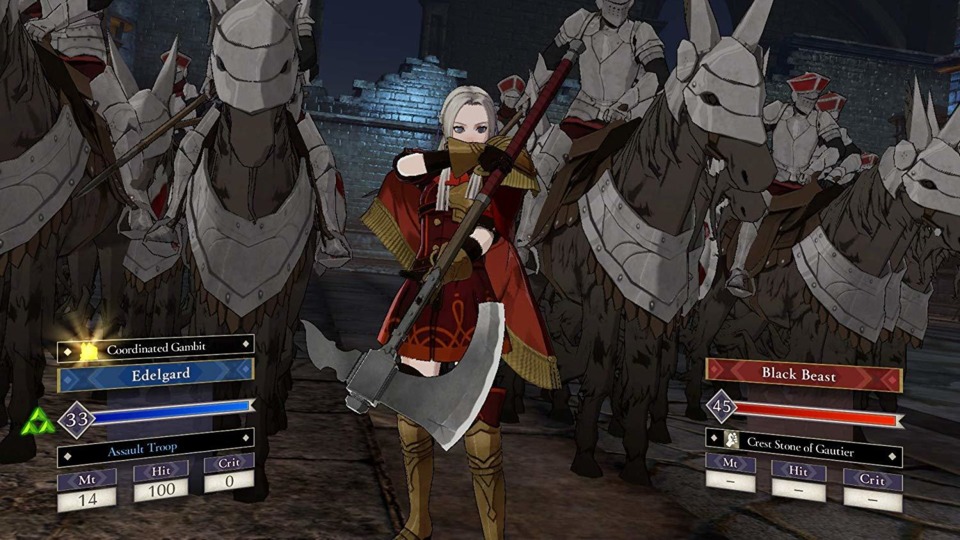
Fire Emblem may be more well known as a tactics series, but the real treat of Three Houses is that it doubles as a visual novel, and a surprising great one at that. The main loop of this game involves building relationships with and between different characters and seeing how their stories and interactions play out. It’s like if the social link system from Persona could go between your party members as well, and there were an entire school of anime teenagers to choose from. What’s most impressive, however, is that the character work in this game feels meaningful. Characters start out feeling like tropes but go into surprising directions. Even the students I didn’t end up liking still had enough going on to feel worth exploring their stories and how they all came together throughout its lengthy campaign. I went deep into recruiting students from different houses, drafting lesson plans to mold each character into the fighter I wanted, and putting them in activities or battle configurations together to see the stories I was most interested in. And while I'm not going pretend that this is the deepest strategy game around, I enjoyed seeing how the units played off of each other and how the different classes changed as my characters leveled up.
5. Control
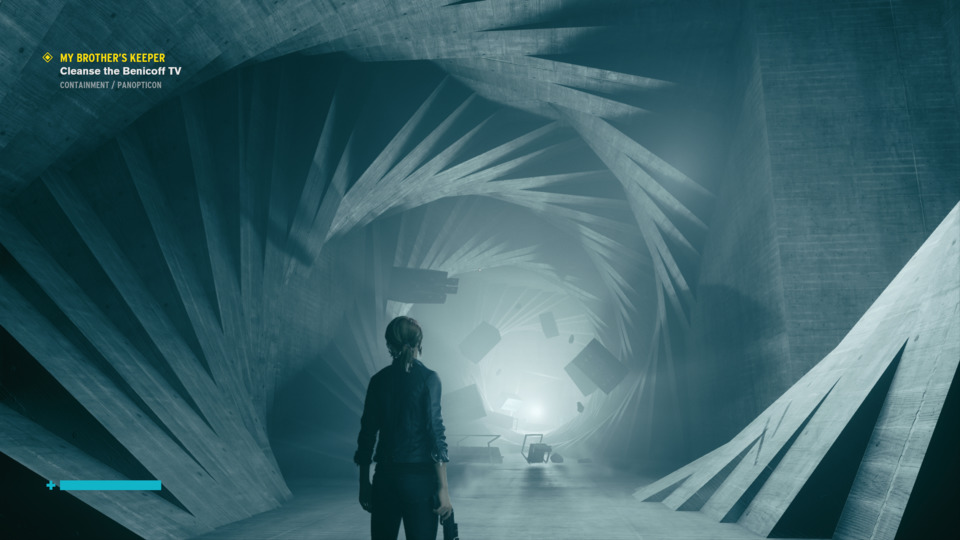
I’m going to be honest, my first few hours of Control were frustrating. I instantly loved the game’s weird, Lynchian atmosphere and wanted to know more about the bizarre characters and settings it presented, but I felt like I was fighting poor performance (even on an Xbox One X), unnecessarily punishing checkpoints, and extreme difficulty spikes at every turn. It’s a testament to how great the world building is that I pushed through one particularly annoying boss fight (and its awful checkpoint beforehand). I’m glad I did though because once you get your full array of psychic powers, Control becomes something special. The movement and combat feel fluid and the game’s latter half of full of trippy moments that play with audio and visual design in spectacular ways, making good on its premise in the process. It’s the kind of experience that sticks with you long after you’re done with it, as there just aren’t enough games like it. The more I thought about it in the months since I finished it, the easier it became for me to recommend and the higher it crawled on my list. Yes, it performs terribly on consoles, and no, I didn’t love every moment of it. But at the same time, Control is exceptional when everything is clicking, and it gave me an experience unlike anything else I’ve ever played. Oh, and it plays Porcupine Tree's "Fear of a Blank Planet" during the end credits, so it's automatically in my top 5.
4. Bloodstained: Ritual of the Night
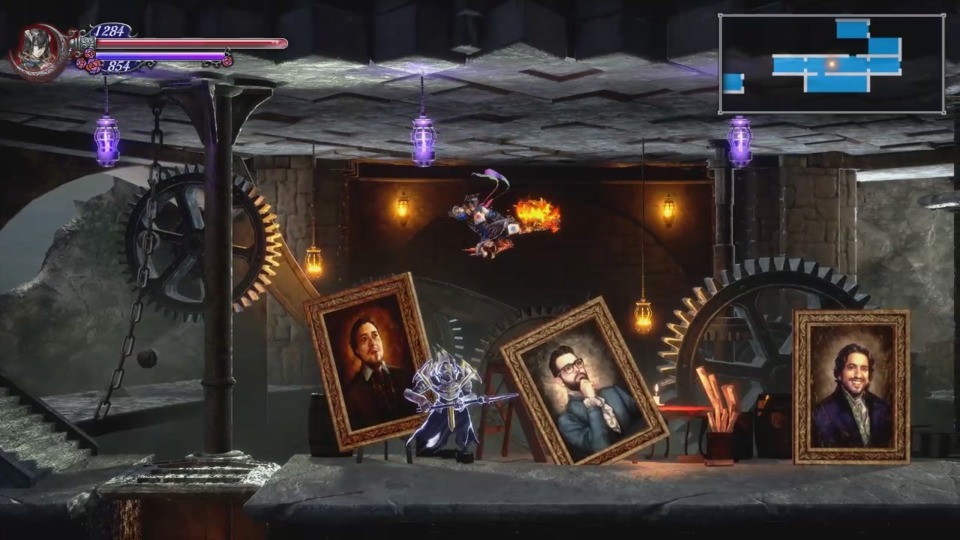
What a bizarre video game. On the surface, Bloodstained is such an obvious spiritual successor to Symphony of the Night that it puts it openly in its title. At a time where a new indie Metroidvania is seemingly released every week, an oft-delayed Kickstarted tribute to a specific one from 1997 really has no business being good… at all. However, Bloodstained leans so far into its Kickstarter origins that it comes out feeling like the best kind of homage. As in one, that nails the look and feel of the original, and then takes in weird directions that a major studio never sign off on. The tone is a mix of Castlevania nostalgia and silly humor, and it couldn’t be more fun. Mixed in with its gothic monsters are pets from what I assume are backers of the game, and Castlevania’s portrait enemies are replaced with just pictures of seemingly random people (again, probably backers). That goofiness extends to the writing and gameplay, where there’s an overwhelming amount of powers, summons, recipes, and traversal options that all but break the game in interesting ways, while also giving the player far greater freedom about how to explore and fight than just about any other game of its kind. It’s a shockingly tremendous game, and one of my biggest surprises of 2019.
3. Apex Legends
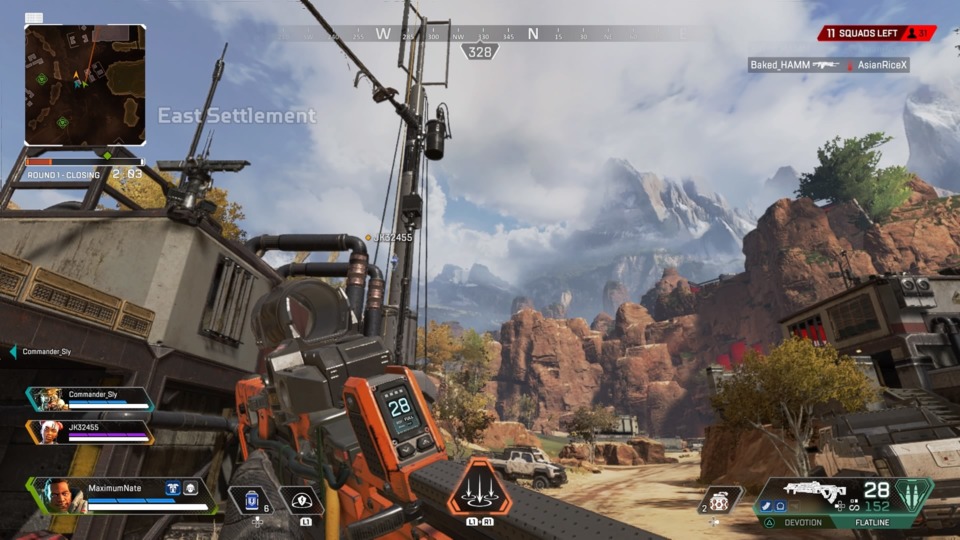
As someone who grew up playing first-person shooters on controllers, Apex Legends is the battle royale I wanted when the genre broke out a few years ago. It’s a fun, fast-paced game that doesn’t feel as punishing or isolating as the tactical shooters the genre originally spun out of, and has a varied cast of characters with unique and meaningful special abilities. Most surprisingly, however, is how well Apex deals with communication among your teammates. My experience with multiplayer shooters is typically that I’ll play with friends until they fall off. Then I’ll play with strangers until the community proves toxic enough that it ruins my experience and I fall off (sorry Overwatch…). Apex feels like a revelation in this respect and and kept me playing long after my friends decided it wasn’t for them. It never bothered me that you had to play on a team, as the robust pinging system to highlight enemies, loot, or suggested directions to move allowed me to communicate strategically with strangers without ever having to hook up my mic or hears theirs. It reminded me of how fun multiplayer shooters can be, and I can’t wait to get back into it in 2020.
2. Disco Elysium
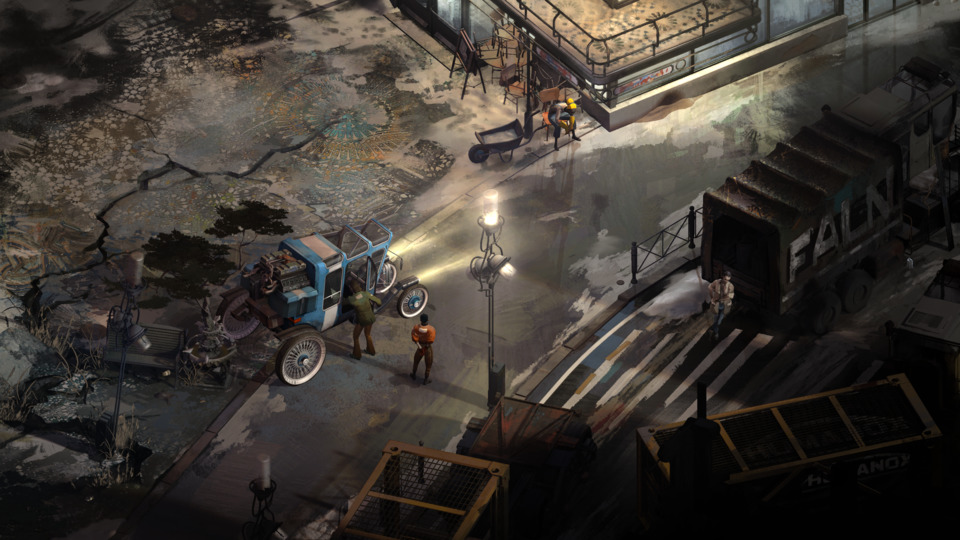
From its opening few hours, I wasn’t sure if I was going to like Disco Elysium. It's a cross between an old-school CRPG and point-and-click adventure game that presents a grimy, almost nihilistic aesthetic from the outset, and despite some silly touches, I feared it would lead to the type of cynical yet literary sounding writing I grew out of after high school. However, the more I unpacked of Disco Elysium’s world, exploring and making choices, letting the game roll dice for skill checks behind the scenes, the more I begin to see how the world reacted to literally everything. And I began to love it. There was a moment early on where the personified voices in my character's head, each one fully written and tied to its own skill and level, started arguing about how I should a respond to situation. I realized I wasn’t gaining an advantage by putting points into specific skills but creating the bias lens my character sees Disco Elysium through. It wasn’t just that my points in empathy allowed me to pass a skill check and gain more information, but that my character would start thinking about the world around through an emphatic perspective, and and that it would be up to me whether I cared enough to listen. Essentially, I was leveling up a series of untrusty narrators inside my own head. However, it’s not just that my character has its own biases, but that every other character you meet in this city block has their own sets of biases as well, and they’ll react to what you say and do based on each other's biases intersect. And if you know where to look at what to say, you’ll learn about where those biases come from and the politics that shaped Revachol. You see how these characters were shaped by recent history and why their conversations go a certain way, and it only helps that Disco Elysium wears politics boldly on its sleeve in a way few games have the courage or ability to. There are layers to the world building here rarely found in video games, and it’s not just that Disco Elysium feels adaptive, but lived in. It’s an impressive achievement in writing and game design, all told in the medium of a CRPG that completely eschews combat.
1. Outer Wilds
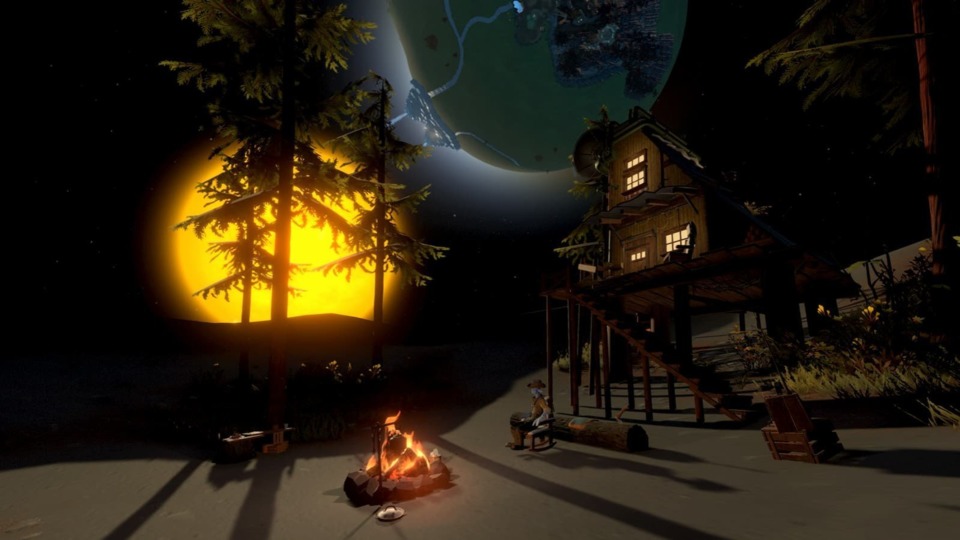
How do I even describe a game like Outer Wilds? Seriously, I’m asking for help here. You can pitch it as some combination of the exploration and emergent storytelling of Breath of the Wild, the space travel of No Man’s Sky, the logic puzzle structure of Return of the Obra Dinn, the time loop of Majora’s Mask, the environment puzzles of The Witness, and the non-linear narrative of Gone Home, but not only is that hypothetical game all but impossible to picture, it doesn’t tell the story of why Outer Wilds is so special. And as I’ve found many times through trying and pleading to recommend this game to anyone who will listen over the latter half of 2019, it’s a game that I want so badly to explain all of the amazing moments packed into it, but I also don’t want these moments to be spoiled.
The thing is, so much of what I love about Outer Wilds is in the joy of discovery, and how it understands that better than just about any of game I’ve ever played. It tells a complex, nuanced story that can pieced together in whatever order the player finds it, and while it gives you tools to help draw through lines to help connect everything, it leaves it up to you to think critically about the world around you. And no, Outer Wilds is not a “narrative” game in the traditional sense. This story, while intricately layered and deeply moving, is told primary through translated writing left behind and connects directly to the gameplay. Nothing ever unlocks or upgrades, and there is no combat to speak of, but the knowledge you as the player gain by exploring allows you to solve environmental puzzles and explore areas you didn’t even know existed. Essentially, this is a game about exploring to collect information, and using that information to find more information, and so on, until you have enough information to fit together a beautifully written narrative wrapped inside the most satisfying logic puzzle imaginable.
To put in it perspective, Outer Wilds is not just an easy choice for my favorite game of the year. It’s also my favorite game of the decade, and even after just 6 months away from it, and I’m comfortable in calling it my favorite game of all-time. It’s not just that it’s that good, but that I don’t know if I’ve ever played a game that was more perfectly aligned with the way my brain operates. And I’m not sure I’ve ever played a better example of what I love about video games, both as a form of entertainment and as a medium for art. It contains some of the greatest moments I’ve experienced in a video game, and sticks the landing in a profound way that I desperately want to discuss, but can’t. Play this game. Please. I can’t guarantee that you will love it as much as I did, but I can assure it’s unlike anything you’ve ever played.
